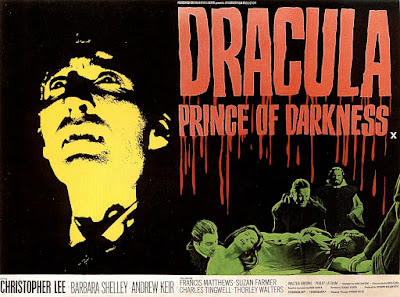Over at Press Play, I have
a brief text essay about and a video tribute to Christopher Lee, who died on June 7 at the age of 93. Here's the opening of the essay:
Christopher Lee was the definitive working actor. His career was long, and he appeared in more films than any major performer in the English-speaking world — over 250. What distinguishes him, though, and should make him a role model for anyone seeking a life on stage or screen, is not that he worked so much but that he worked so well. He took that work seriously as both job and art, even in the lightest or most ridiculous roles, and he gave far better, more committed performances than many, if not most, of his films deserved.
Read and view more at Press Play.
Press Play has now posted
my new video essay with a brief accompanying text essay about the great new science fiction action movie political parable satire call to revolution
Snowpiercer, directed by Bong Joon-Ho, a filmmaker I am especially enamored of. (
Memories of Murder is easily among my favorite movies of the last 15 years
, and back in 2010
I defended Bong's previous film, Mother, from the criticisms of Richard Brody at the
New Yorker.)
As a little bit of extra, below the fold here I'll put some thoughts on elements of the remarkable ending of the film...
First, for some information on the background and references of
Snowpiercer, see
Scott Tafoya's piece at RogerEbert.com, and for a good analysis of the revolutionary ideology of the film, see
"Smash the Engine" by Peter Frase at Jacobin.
The audacity I see in the ending of
Snowpiercer comes not just from its framing of revolution as something that must smash the logic of the system, but also from the way it shows that system to be not just hierarchical in terms of class, but of also being fundamentally racialized.
First, there is the inescapable fact that most of the people who have been saved from the apocalypse are white and English speaking. Even the people at the back of the train, though more diverse than the people in the front, are predominantly white and English speakers. All of the positions of highest power in the train are positions held by white English speakers, and the ultimate positions of power are held by white men and passed on to white men (Wilford to Curtis).
As Curtis moves closer and closer to the front, the white supremacy becomes obvious. There's the classroom, where the vast majority of students are very white (and often blonde), with a few Asians in there (the pre-apocalypse notion of Asians as educational high achievers is thus replicated in the train), and one black girl (at least that I saw). The overall effect is of lily-whiteness, with a few special people added.
The people at the dance party are almost entirely white.
The people who apparently stepped out of The Great Gatsby are white.
The women getting their hair styled are white.
It's worth noting, too, how so much of what we see in the front cars evokes the old white world, a world of the 1920s-1950s — an America before the successes of the civil rights movement, of women's liberation struggles, of gay liberation, etc. (The car where everyone is taking drugs evokes even earlier ideas. It's like an opium den, a powerful force in the orientalist imagination of the yellow peril in the 19th and early 20th centuries, and a setting with plenty of
cinematic history.)
Early in the film, Curtis tells Edgar that once
they get to the front of the train, things will be different. "But
how different, really?" the film asks at the end. "Know your place!" Mason (Tilda Swinton) tells the rabble. Curtis learns what his place is from Wilford: the place of the white patriarch.
That system cannot be reformed. It will do no good to have somebody else in charge of the engine. The logic of the system must not be reformed, it must be defied and destroyed.
And thus the ending, which stops the train's circular journey and potentially annihilates the last remnants of humanity.
The system is so corrupt, so incapable of reform, that what is known to be left of humans is worth destroying rather than continuing along the same tracks.
If there is to be a future for humanity, it looks like this, the new Adam and Eve:
They might be destroyed by the cold, white world. They might be a meal for the white polar bear. But maybe, somehow, they will survive and discover or create a new world, a world where humans are on a different journey, subject to a different system, not oppressed by the cold, unbearable whiteness.
Bong leaves it to us to imagine their fate.












